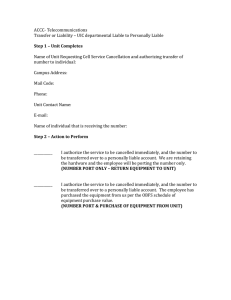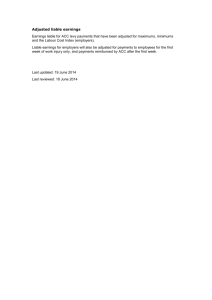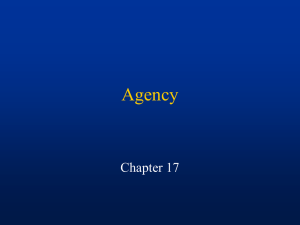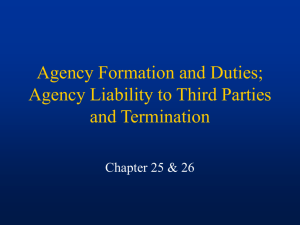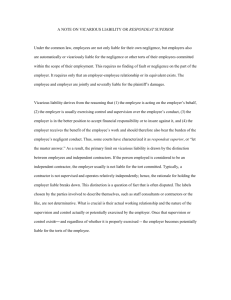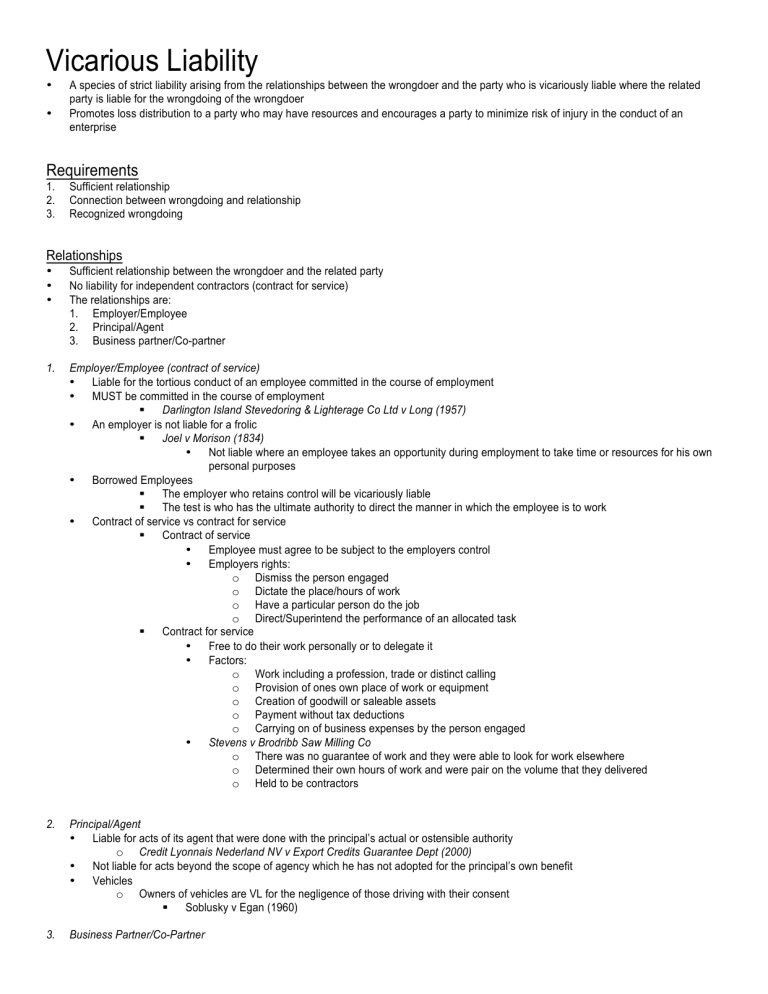
Vicarious Liability • • A species of strict liability arising from the relationships between the wrongdoer and the party who is vicariously liable where the related party is liable for the wrongdoing of the wrongdoer Promotes loss distribution to a party who may have resources and encourages a party to minimize risk of injury in the conduct of an enterprise Requirements 1. Sufficient relationship 2. Connection between wrongdoing and relationship 3. Recognized wrongdoing Relationships • • • Sufficient relationship between the wrongdoer and the related party No liability for independent contractors (contract for service) The relationships are: 1. Employer/Employee 2. Principal/Agent 3. Business partner/Co-partner 1. Employer/Employee (contract of service) • Liable for the tortious conduct of an employee committed in the course of employment • MUST be committed in the course of employment § Darlington Island Stevedoring & Lighterage Co Ltd v Long (1957) • An employer is not liable for a frolic § Joel v Morison (1834) • Not liable where an employee takes an opportunity during employment to take time or resources for his own personal purposes • Borrowed Employees § The employer who retains control will be vicariously liable § The test is who has the ultimate authority to direct the manner in which the employee is to work • Contract of service vs contract for service § Contract of service • Employee must agree to be subject to the employers control • Employers rights: o Dismiss the person engaged o Dictate the place/hours of work o Have a particular person do the job o Direct/Superintend the performance of an allocated task § Contract for service • Free to do their work personally or to delegate it • Factors: o Work including a profession, trade or distinct calling o Provision of ones own place of work or equipment o Creation of goodwill or saleable assets o Payment without tax deductions o Carrying on of business expenses by the person engaged • Stevens v Brodribb Saw Milling Co o There was no guarantee of work and they were able to look for work elsewhere o Determined their own hours of work and were pair on the volume that they delivered o Held to be contractors 2. Principal/Agent • Liable for acts of its agent that were done with the principal’s actual or ostensible authority o Credit Lyonnais Nederland NV v Export Credits Guarantee Dept (2000) • Not liable for acts beyond the scope of agency which he has not adopted for the principal’s own benefit • Vehicles o Owners of vehicles are VL for the negligence of those driving with their consent § Soblusky v Egan (1960) 3. Business Partner/Co-Partner Connection • • • • Must be a sufficient connection between the conduct and what the employee was employed to do 1. The act must be in the course of employment • Must not be an independent wrongful act • Acts done in the furtherance of the masters interests will be considered in the course of employment • Chaplin v Dunstan o Deviation by the employee to get a drink when a collision occurred – employer was held liable – because the deviation was not altogether unconnected with the employment • Storey v Ashton o Employee was to deliver wine o He deviated from the directed route to visit family members, on the way he cause personal injury to another o Held that the journey has nothing to do with the employment therefore the employers were not vicariously liable 2. Must be within the scope of authority of the wrongdoer Employers will be liable for: o An improper mode of an authorised act § Bugge v Brown • Defendant employed a farmhand who was supplied with cooked meat, but on this occasion he was supplied with raw meat and told to cook it in a hut • He instead lit a fire outside near where he was working which got out of control and spread to the plaintiffs land • Held that his lighting of the fire was within the scope of employment as his act was sanctioned § Pollard v John Pire & Son • Employee hit the plaintiff after suspecting that he was stealing sugar • Employer held liable – As an employee is authorised to do acts for the protection of an employers property, although he is not bound to do them, the act was not unreasonable and therefore authorised o A wrongful act actually authorised by the employer Independent personal act Express Prohibition • Ineffective to prevent VL where the acts were still a mode of doing what the employee was authorised to do • The prohibition must limit the steer of employment not just conduct Wrongdoing • There must be an actual wrongdoing o
